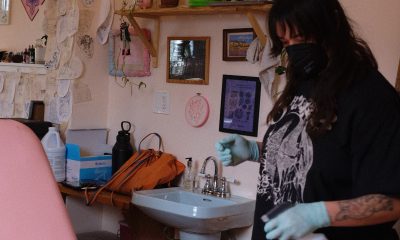Maryland
Md. governor visits, praises Baltimore LGBTQ Safe Haven
Moore calls facility ‘invaluable resource’ for community
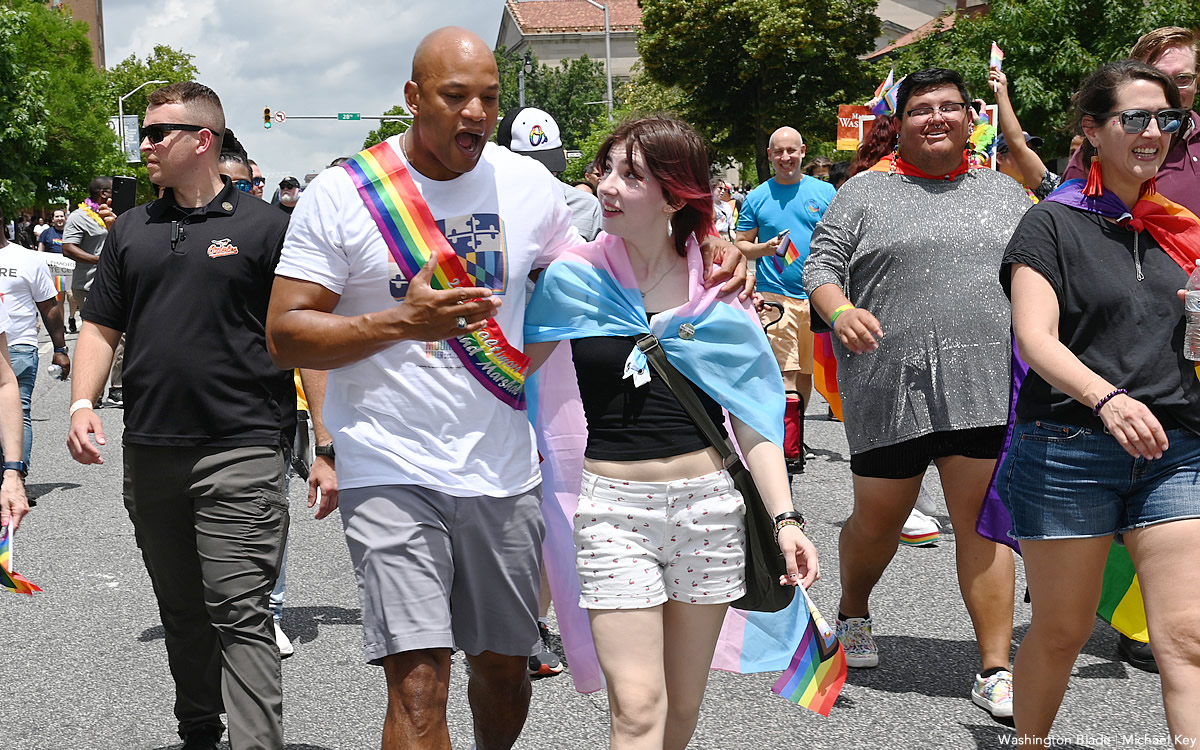
Maryland Gov. Wes Moore and the state’s lieutenant governor, Aruna Miller, on Sept. 8 visited Baltimore Safe Haven, a transitional housing and support organization that provides a wide range of services for the LGBTQ community, with a special outreach to the transgender community.
A statement released by Moore’s office says the visit was made in partnership with the Maryland Commission on LGBTQIA+ Affairs and provided an opportunity for him and Miller to tour Safe Haven’s housing facilities and learn more about the services it offers.
“In Maryland, we lead with love and inclusion, and nobody should have to justify their own humanity,” Moore said in a statement. “Baltimore Safe Haven provides help and hope to the people who need it most,” he said. “The only way forward is together, and Baltimore Safe Haven has a partner in the State House.”
Moore added, “We have a lot of work to do, and we must tackle that work in partnership. If we do, we can build a kinder, safer Maryland for all.”
Miller said in the statement that she and the governor fully support Baltimore Safe Haven’s work and mission.
“Baltimore Safe Haven’s services are a critical link in the continuum of care for our LGBTQIA+ community, specifically for Black transgender Marylanders, and our administration is proud to be their partner,” she said.
Iya Dammons, the founder and executive director of Baltimore Safe Haven who on July 28 officially opened a D.C. Safe Haven facility at 331 H St., N.E., said the visit by Moore and Miller to the Baltimore facility has highlighted the organization’s work to provide support for people in need.
“Baltimore Safe Haven has been at the forefront of this fight, providing a lifeline to those who have been disproportionately affected by homelessness, discrimination, and violence,” she said in a statement. “During their walk-through, Lieutenant Governor Aruna Miller and Governor Wes Moore witnessed firsthand the compassionate and empowering environment created by Baltimore Safe Haven.”
Added Dammons, “We hope that their visit will inspire others to join our mission to create a more inclusive and equitable Maryland.”
Like the Baltimore Safe Haven operation, Dammons said the D.C. Safe Haven will provide a wide range of services, including housing for homeless LGBTQ youth, a computer lab, a drop-in center, a case manager, and a once-a-week clinic supported by the University of Maryland.
Maryland
A Baltimore theater educator lost jobs at Johns Hopkins and the Kennedy Center
Tavish Forsyth concluded they could not work for Trump
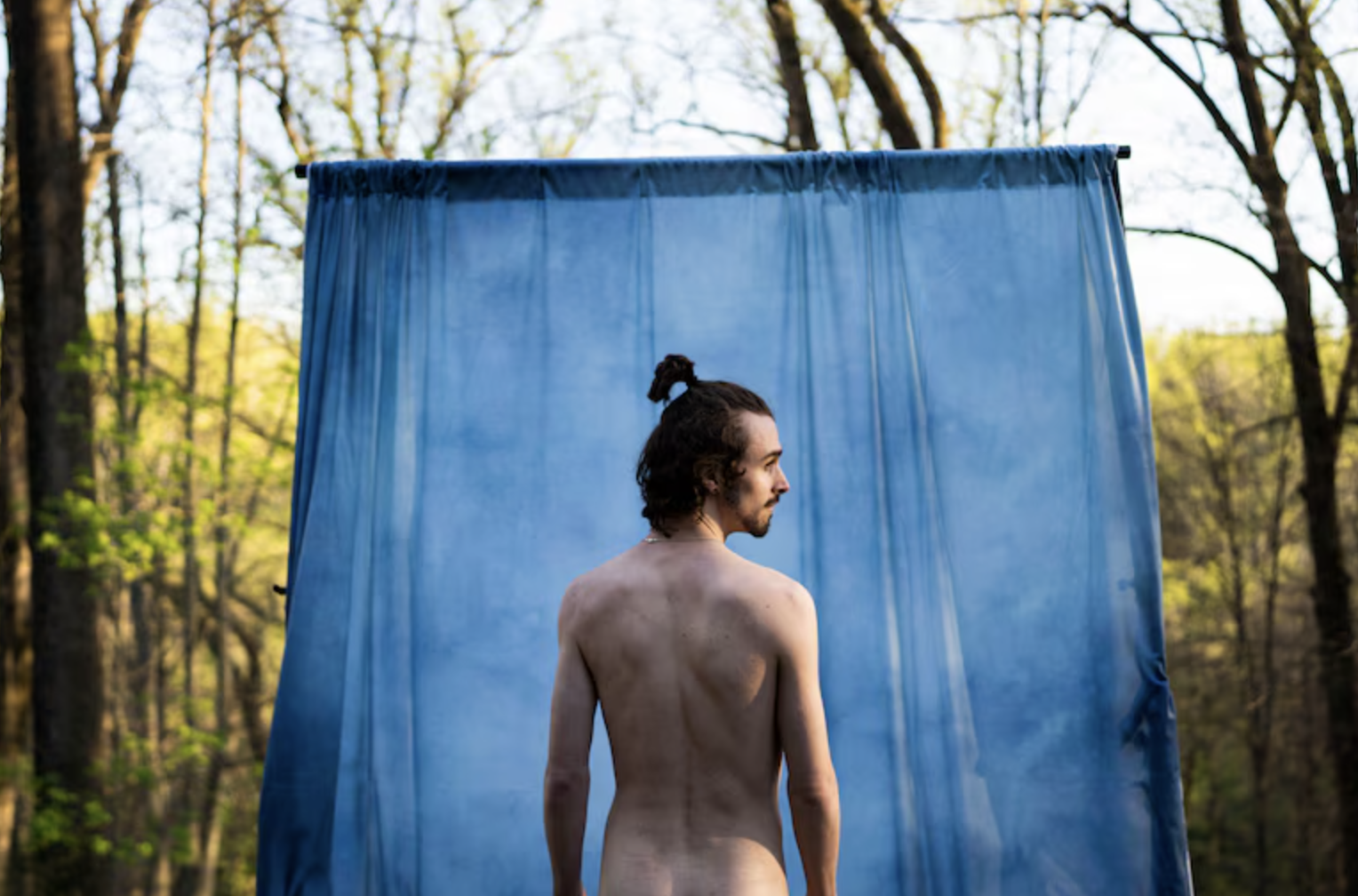
BY WESLEY CASE | Tavish Forsyth had come to a conclusion: They could not work for President Donald Trump.
So the 32-year-old Baltimore resident stripped down, turned on their camera, and lit their career on fire.
“F—— Donald Trump and f—— the Kennedy Center,” a naked Forsyth, an associate artistic lead at the Washington National Opera’s Opera Institute, which is run by the Kennedy Center, said in a video that went viral. The board of the nation’s leading cultural institution had elected Trump just weeks prior as its chairman after he gutted the board of members appointed by his predecessor, President Joe Biden.
The rest of this article can be read on the Baltimore Banner’s website.
Maryland
Md. schools plan to comply with federal DEI demands
Superintendents opt for cooperation over confrontation
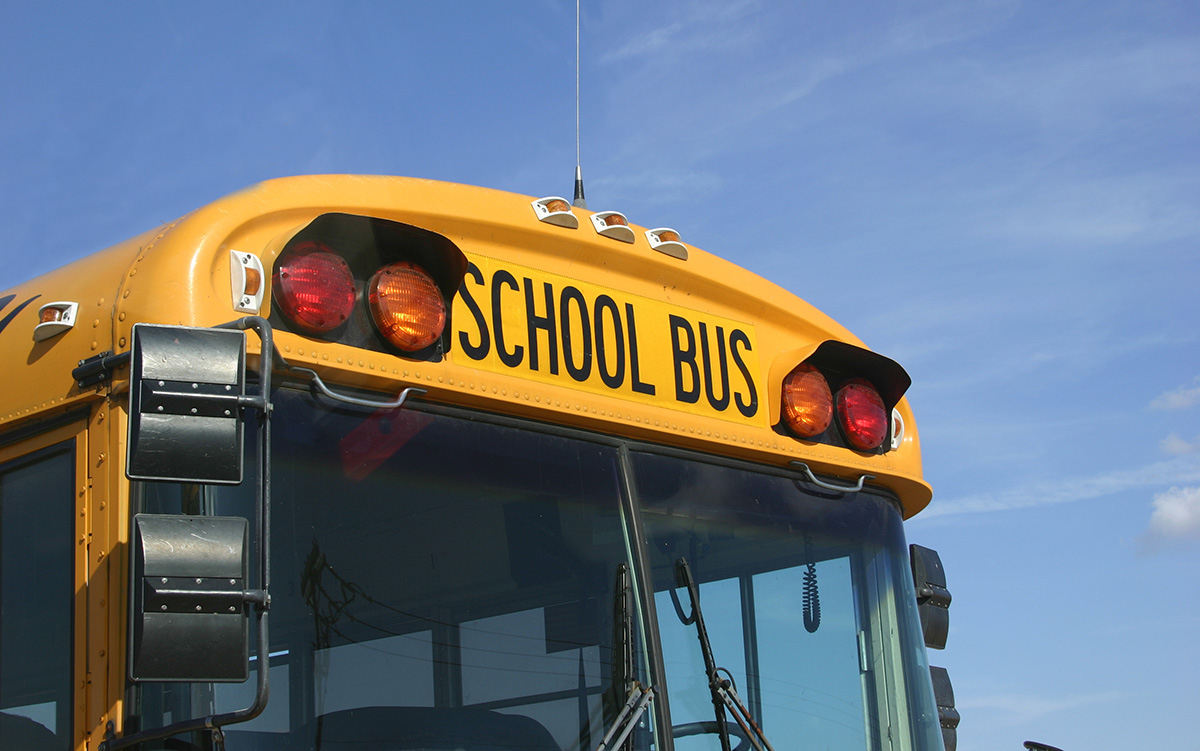
By LIZ BOWIE | Deciding not to pick a fight with the Trump administration, Maryland school leaders plan to sign a letter to the U.S. Department of Education that says their school districts are complying with all civil rights laws.
The two-paragraph letter could deflect a confrontation over whether the state’s public schools run diversity, equity, and inclusion programs that the Trump administration has called illegal. The Baltimore Banner reviewed the letter, which was shared by a school administrator who declined to be identified because the letter has not yet been sent.
Maryland school leaders are taking a more conciliatory approach than those in some other states. Education leaders in Minnesota, New York, Colorado, Oregon, Vermont, and Wisconsin said they will not comply with the federal education department’s order, the demands of which, they say, are based on a warped interpretation of civil rights law.
The rest of this article can be found on the Baltimore Banner’s website.
Maryland
FreeState Justice: Transgender activist ‘hijacked’ Moore’s Transgender Day of Visibility event
Maryland Commission on LGBTQIA+ Affairs describes Lee Blinder’s comments as ‘call to action’
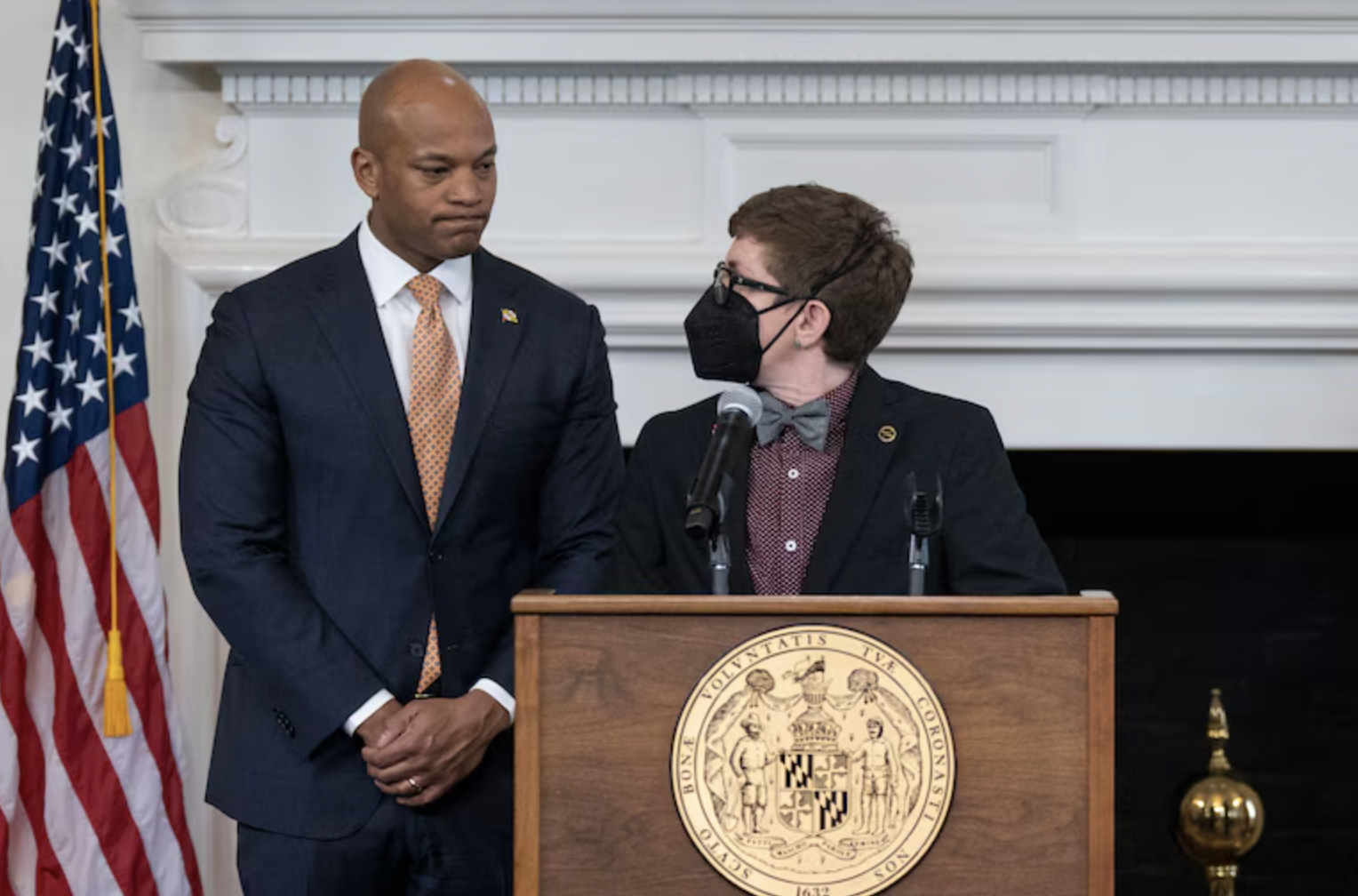
FreeState Justice on April 11 released a statement criticizing the way that Trans Maryland Executive Director Lee Blinder treated Gov. Wes Moore during a Transgender Day of Visibility event.
FreeState Justice was extremely disappointed with the criticisms of Moore on the Transgender Day of Visibility, saying it was “hijacked by public hostility” by Blinder. The Baltimore Banner reported how Blinder “laid out how the Democratic governor has let down transgender Marylanders by not putting money in the budget and not backing needed policy changes.”
The Washington Blade interviewed Blinder after the March 31 event.
“The intention of what I shared is to show to the governor that this is a community in distress. You know, we are in a real state of emergency for the trans community and there are very few opportunities that the community has to share this directly with the governor.” Blinder told the Blade. “We’re really grateful to the governor for everything that he’s done in the past for this community, but the circumstances have changed and we really need to see very specific actions taken in order to ensure this community has the ability to exist in public space.”
FreeState Justice said Moore did not deserve such criticisms during the event and added in a Blade oped it is “time for new leadership on the Maryland LGBTQIA+ Commission. Leadership that values and prioritizes coalition over conflict. Leadership that invites feedback and shares power. Leadership that understands how Annapolis operates, how budgets are constructed, and how community victories are won.”
“We’re not saying don’t challenge power. We’re saying do it with purpose. Do it with facts. Do it with a strategy. If you’re going to call yourself a leader in this movement, show us the policy platform. Show us the data. Show us the budget line. Show us the work,” wrote FreeState Justice.
The Maryland Commission on LGBTQIA+ Affairs has met to address FreeState Justice’s statements.
“During the Transgender Day of Visibility ceremony at the State House, the commission’s chair offered remarks reflecting the real fears, concerns, and hopes of the trans community. These remarks were not a call-out, but a call to action,” the commission said in their call to action statement it sent to the Blade. “The chair’s words echoed the thousands of voices we’ve heard across the state through phone calls, emails, and messages on social media to our staff, commissioners, and their affiliated organizations.”
The statement outlines what the call to action entails, addressing what the commission found to be the most pressing issues for transgender Marylanders. They include a lack of dedicated funding, barriers to affirming healthcare, housing insecurity and homelessness, discrimination in education and employment, and escalating violence, harassment, and hate.
“We remain deeply committed to working in partnership with the Moore-Miller administration, the General Assembly, state agencies, nonprofit organizations, and community partners to ensure LGBTQIA+ Marylanders are seen, protected, and supported in policy, budget, and in practice,” reads the statement.
-

 Federal Government4 days ago
Federal Government4 days agoHHS to retire 988 crisis lifeline for LGBTQ youth
-

 Opinions4 days ago
Opinions4 days agoDavid Hogg’s arrogant, self-indulgent stunt
-

 District of Columbia4 days ago
District of Columbia4 days agoD.C. police seek help in identifying suspect in anti-gay threats case
-

 Virginia4 days ago
Virginia4 days agoGay talk show host wins GOP nom for Va. lieutenant guv

